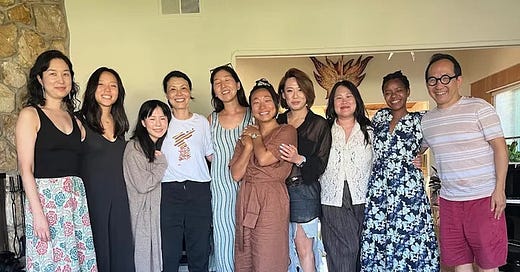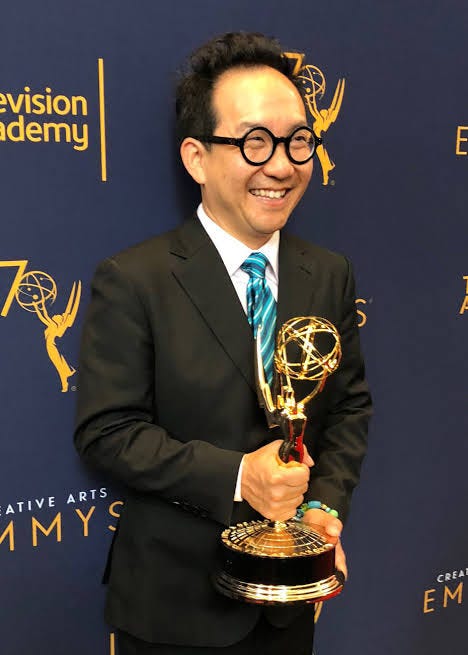My Korean friends lost their home in the LA fires
…it made them reflect on creative urgency, the Korean War, and their relationship to the American Dream
When the Palisades fire began on January 7th, I immediately thought of my friends Jisung and Anthony. They had just hosted an L.A. Korea Peace Now meetup, filling their beautiful home in the Palisades with shared food, stories, laughter, grief, and rage about our families, shared histories, and dreams of peace in our homeland.
We’d walked through their rooms, marveling at Anthony’s Emmys trophy casually perched above their TV (he’s the animation director behind some of your favorite TV shows) and Jisung’s spiral-bound thesis challenging South Korea’s capitalist “success” story through Korean cinema (she is the radical queer feminist scholar that everyone needs in their lives). Jisung and Anthony’s home reminded me of my childhood house — warm, utilitarian, and unfussy — and I soaked in how familiar its practical Korean-ness felt to me.
But now the fire was inching closer and closer to their house. I texted Jisung:
Me: Are you and your family okay?!
Jisung: We are in the car 🚙 trying to get out! Still In Palisades, on pch 🔥😢😭 so scary terrifying
Me: oh my goddd do you need somewhere to stay??
Jisung: Heading to Line Hotel in Ktown. At least we’ll eat well
I chuckled helplessly at her dark humor. As the fire engulfed the entirety of their neighborhood, I refreshed the fire map every few hours to see whether their house had escaped the flames. There was nothing to do except text Jisung, I’m so so sorry. Let me know if there is anything I can help with.
Our GYOPO community organized a fundraiser for Jisung’s family, which helped them settle into a long-term rental in Sawtelle. True to character, Jisung and Anthony invited everyone over for our next L.A. KPN meeting in February, just one week after they’d moved into their new house.
We sat in a circle in their living room, listening to them reflect on how the last month had been for them.
“I’ve never felt so much joy and love in my life,” Anthony said. “Amidst such devastation, community members, friends, complete strangers have helped us unconditionally.”
“Our Korean ancestors’ lives have been that of war, loss, and displacement,” Jisung said. “I’ve never felt closer to that history. This is in our blood.”
I couldn’t believe that even after losing almost every material possession they owned, they were speaking so calmly and profoundly about love and ancestral connection.
So I asked if they’d be willing to share some of their story with me over some tea. Here is a brief Q&A, condensed for clarity, with the words that they honored me with.
Q: Anthony, how did your parents come to live in the Palisades?
Anthony: My father, as an engineer in the 1970s, was able to buy four houses in the Pacific Palisades. That was my dad's financial legacy as an immigrant engineer landlord. I was living there by his good graces. He let us live there at a discount.
I always felt weird living in the Palisades, because I don't make Palisades money. But then I realized most people get to live in the Palisades because they're inheriting it from somewhere else. I always felt a little bit strange about living in the neighborhood. I didn't connect with anybody over there. It was a lot of old White people.
I was always a little bit sheepish about inviting people over, because it just felt really show off-y, and I didn't feel comfortable. But I should have totally not given a shit. And I think when Jisung started inviting people over, saying, “this is a party house,” it was really fun.
Jisung: I grew up in Koreatown…I mean, how many of us Korean Americans have ever been inside a home in Pacific Palisades? Very few. I know that when I opened the house up, for many people, it was their first time being in the Palisades.
Q: You mentioned your evacuation made you think of your Korean ancestors and war. What went through your mind as you were escaping the fires?
Jisung: When we lost the house and we were on the run and scrambling through the motions of—what do we do next? Did our house burn down? Those very first minutes and days I was very much feeling how my grandparents must have felt [when the war started]. The 피난, the leaving—everything started as emergency evacuation. Nobody thought that it would be a permanent displacement.
I was thinking about our ancestors, and I was thinking about my mom and my dad being little kids [during the Korean War]. My mom was born in 1950 so she was a baby. My dad was born in 1948 so he was just a baby too. I could feel more of their trauma in an embodied way. It wasn't just theoretical or historical or something I read. It was somatic. It was happening to us, and I imagined how this form of climate refugeeism is coming for everybody. Maybe in the United States we are on the frontlines [of climate refugeeism], but in a global context of migration as a result of climate change, it's been happening, it's here, it's now.
I was thinking about how they said 80% of North Korea was destroyed by fire bombing. Fire is what happens during war. You see a lot of burning buildings. That's why with Palestine, too, you can't help but feel for the people who are being attacked because they want your land.
Q: Anthony, you mentioned feeling an overwhelming outpouring of love in the weeks following the fire.
Anthony: I was seeing and hearing from people more than I had years. It's been wild with people reaching out, donating to the GoFundMe campaign. People are so readily expressing their generosity and their love. It was very eye-opening in that sense. That was the only time when I really became very emotional. I wept from that beauty and love.
Q: You mentioned an urge to almost manically create after the loss. Anthony, you’ve been busking and playing violin on Sawtelle Boulevard and Jisung, you’ve been leading Julia Cameron’s The Artists’ Way for us. Can you tell me about that?
Jisung: I feel more of an urge to take bigger risks. When one of the worst things that can happen to you happens, you realize you can survive. Our imagination can actually be more dystopian than our lives. You recognize that your value is not connected to your stuff or your house, but it’s really connected to the kinds of communities you have in your life.
Anthony: There’s more of an urgency around creating, almost like it’s a physiological necessity. I'm just guided now by what makes me feel good. Morning pages, walking, playing music, drawing—I realized that these are the things that I enjoy, that I really derive pleasure from, and I seek that out however I can. It's like my sense of being and survival. And so that's what I want to do as much as I can, now that the house, the status, all that stuff is gone.
When I was living in the Palisades, I tried busking there. I got zero dollars or audience. All those rich White people were so shut down emotionally. There's something about that sort of privilege that can lead to a coarsening.
Now, when I walk out to busk, I see so many faces. A lot of Asian faces.
Jisung: All the clutter is gone. I just want to dive in and let myself see where that takes me. I love The Artist’s Way, because it's all about, “Don't think, don't doubt, just do.”
Anthony: After you lose everything, you just don't care anymore. That has been a very liberating thing.
Q: Jisung, are any of your reflections drawn from your Buddhist practice?
Jisung: In the context of American capitalism, so much of success and worth is attached to materiality and owning a home. A home in the Pacific Palisades is such a symbol of the American Dream. Everybody wants a nice, fancy house with a pool in a predominantly White, upper class neighborhood. That's kind of the normative idea of success. That is kind of ingrained in all of us growing up.
When we practice Buddhism, I think we are asked to recognize or see desire in a different way, to challenge materiality. Do these desires lead to happiness, or do they lead to suffering? Is it kind of an illusion?
Q: Is there anything you grieved losing from the fire?
Anthony: Not really. With my artwork, I don't care about it after it's done. The thing I love most is making it; I care much more about the process. At its core, it’s sort of Buddhist, that everything is impermanent. You realize that all the notions of security or permanence are totally an illusion. And I know that now viscerally. Everything that is solid will melt into air, and we're just kind of passing through. The fire was something that kind of illustrated that in a profound way. So you start to realize that it’s the immaterial things that are actually the most important. It's the experience of creation. It's the experience of connection. The things themselves, they’re all replaceable.
Jisung: I lost a lot of writing, I lost a lot of art. I was writing every day, so many poems and so many essays.
And to be honest, all my costume jewelry, all my beautiful clothes that I painstakingly collected one by one. I know the story behind each piece. And my dolls that have been with me since I was in my 20s.
Anthony: I grow psychedelic mushrooms. I can restart it again, but it's just after having invested so much time…I had worked for MONTHS to harvest them. I had shrooms for the next 20 years. I had really kind of made a concerted effort to do it well, and I had reaped the rewards. That was my biggest loss.
Q: I chuckled when you said you would eat well at the LINE Hotel and I thought, this is so Korean of you to joke right now. What is the role that dark humor has played to help you process your loss?
Anthony: Oh my god. So we evacuated down the hill to my parents’ home. The fire started getting worse and worse, and we're like, “Oh, we’ve got to get the hell out of here.” And my mom was like, “I'm not going anywhere.” And we're like, “Mom, we’re getting the notifications, we should get going.”
Then she said, “No, I'm staying. It’s gonna be a free cremation.”
Humor is a way of managing emotions. There was a kind of weird absurdity to it, like first you have a house, and then you're at the LINE hotel, and then you realize, “oh, I have no house to go back to.” Humor, I think, is something that helps you ground yourself emotionally. When you burst out laughing, you're totally in the present. That's definitely something that has been instrumental.
I was joking when we went to Koreatown that we're basically following the food. We went there for the noodles. My mom saying that cremation thing was like woah, this is her way of coping.









OMG I'm laughing and crying and hugging you all in this! Anthony and Jisung you are such inspirations thank you for these words.
🙏 Iris, so grateful for this! Thank you for all the magical editing and refining ❤️💕🥰 we are so lucky to be in community together 🍜🥟🍉